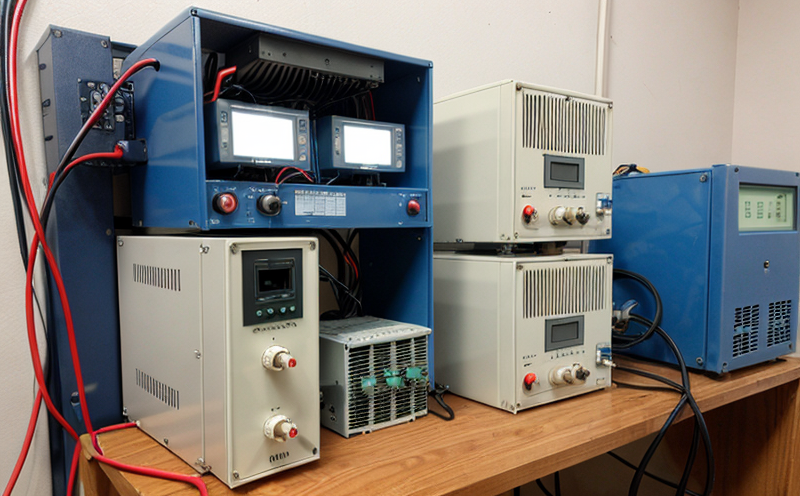IEC 61800 Variable Speed Drive Testing for Railway Applications
The International Electrotechnical Commission (IEC) standard IEC 61800-5-1 defines the requirements for variable speed drives (VSDs) in railway traction applications. This service ensures that VSDs meet stringent safety, reliability, and efficiency criteria essential for safe and efficient operation within a railway environment.
Variable Speed Drives are critical components of modern electric locomotives and train sets, providing precise control over the speed and torque of traction motors. These drives are responsible for optimizing energy consumption, enhancing performance, and ensuring compliance with international standards. The testing process outlined in IEC 61800-5-1 ensures that VSDs operate within specified parameters under various operational conditions.
The scope of this service includes comprehensive testing to verify the following key aspects:
- Thermal stability and dissipation
- Harmonic distortion levels
- Voltage and current balancing
- Dynamic response under transient conditions
- Efficiency across operating ranges
- Safety margins against overvoltage, overheating, and short-circuit faults
The testing protocol involves subjecting the VSD to a series of simulated real-world scenarios that mimic railway operations. This ensures that the drive can handle the most demanding conditions encountered in actual service.
Preparation of specimens for testing includes:
- Installation of the VSD on a test rig
- Connection to appropriate load simulators
- Application of standard operating procedures as defined by IEC 61800-5-1
The use of cutting-edge instrumentation allows for precise measurement and analysis. This includes:
- Digital oscilloscopes for capturing waveforms
- Power analyzers to measure power quality parameters
- Infrared thermography equipment for temperature monitoring
- Data loggers for long-term performance tracking
The testing process is followed by detailed reporting that includes:
- Compliance with IEC 61800-5-1 requirements
- Detailed analysis of test results and their implications
- Suggestions for improvements or modifications
- A summary of findings and recommendations for deployment
This service is crucial for ensuring that VSDs are reliable, efficient, and safe in railway applications. By adhering to IEC 61800-5-1, we provide peace of mind to our clients by guaranteeing compliance with international standards and best practices.
Quality and Reliability Assurance
The quality and reliability of variable speed drives are paramount in railway applications. Our testing ensures that VSDs meet the highest standards, providing a robust foundation for safe and efficient operations. Below is a list of key aspects we focus on:
- Thermal Management: Ensuring that the drive can dissipate heat effectively to prevent overheating.
- Harmonic Distortion: Minimizing harmonic distortion to protect the integrity of electrical systems and reduce interference.
- Voltage and Current Balancing: Maintaining balanced voltage and current levels for optimal performance.
- Dynamic Response: Verifying that the drive can respond quickly and accurately under transient conditions.
- Efficiency: Ensuring high efficiency across all operating ranges to optimize energy consumption.
- Safety Margins: Providing safety margins against overvoltage, overheating, and short-circuit faults.
Our testing process is designed to simulate real-world conditions, ensuring that the drives can handle the most challenging scenarios. This approach guarantees a high level of reliability and performance, which are essential for railway operations.
We use state-of-the-art instrumentation to ensure accurate measurements and detailed analysis. Our team of experts ensures that every aspect of the testing process is conducted with precision and care. This commitment to quality and reliability is reflected in our comprehensive reporting, which includes compliance with IEC 61800-5-1, detailed test results, and recommendations for improvement.
International Acceptance and Recognition
The IEC standards, including IEC 61800-5-1, are widely recognized and accepted globally. This standardization ensures that variable speed drives meet the highest international safety and performance criteria, providing a level of assurance that is essential for railway applications.
Railway systems around the world operate under stringent regulatory frameworks that emphasize compliance with international standards. By adhering to IEC 61800-5-1, we ensure that VSDs meet these requirements, thereby facilitating seamless integration into global railway networks.
The recognition of IEC standards in the railway sector is underscored by their use in major projects across Europe, North America, and Asia. This widespread acceptance ensures that our testing service is not only compliant but also aligned with the highest international best practices.
Our clients benefit from this global recognition through:
- Increased marketability of their products
- Enhanced reputation among regulatory bodies and industry stakeholders
- Reduced risk of non-compliance penalties
- Improved operational efficiency and safety in railway applications
The reliability and performance of VSDs are crucial for the safe and efficient operation of railway systems. By adhering to IEC 61800-5-1, we ensure that our clients' products meet these stringent requirements, providing a robust foundation for successful deployment in global markets.
Competitive Advantage and Market Impact
The demand for reliable and efficient variable speed drives is growing rapidly in the railway industry. By offering IEC 61800-5-1 compliant testing services, we provide our clients with a clear competitive advantage:
- Innovation Leadership: Our expertise ensures that clients stay ahead of regulatory changes and technological advancements.
- Customer Satisfaction: By ensuring compliance with international standards, we enhance customer trust and satisfaction.
- Cost Efficiency: Reducing the risk of non-compliance penalties through comprehensive testing can lead to significant cost savings.
- Sustained Competitiveness: Meeting global standards ensures that clients' products are well-positioned in competitive markets.
The market impact of our service extends beyond individual projects. By promoting compliance with IEC 61800-5-1, we contribute to the overall reliability and safety of railway systems worldwide. This not only enhances the reputation of our clients but also supports the broader industry's goal of sustainable development.
Our clients benefit from this market impact through:
- Increased sales and market share
- Enhanced brand reputation
- Improved operational efficiency
- Reduced risk of product recalls or legal challenges
In conclusion, our IEC 61800-5-1 compliant testing services provide a robust foundation for success in the railway industry. By ensuring compliance with international standards and best practices, we help clients achieve their business goals while contributing to the safety and efficiency of global railway systems.





